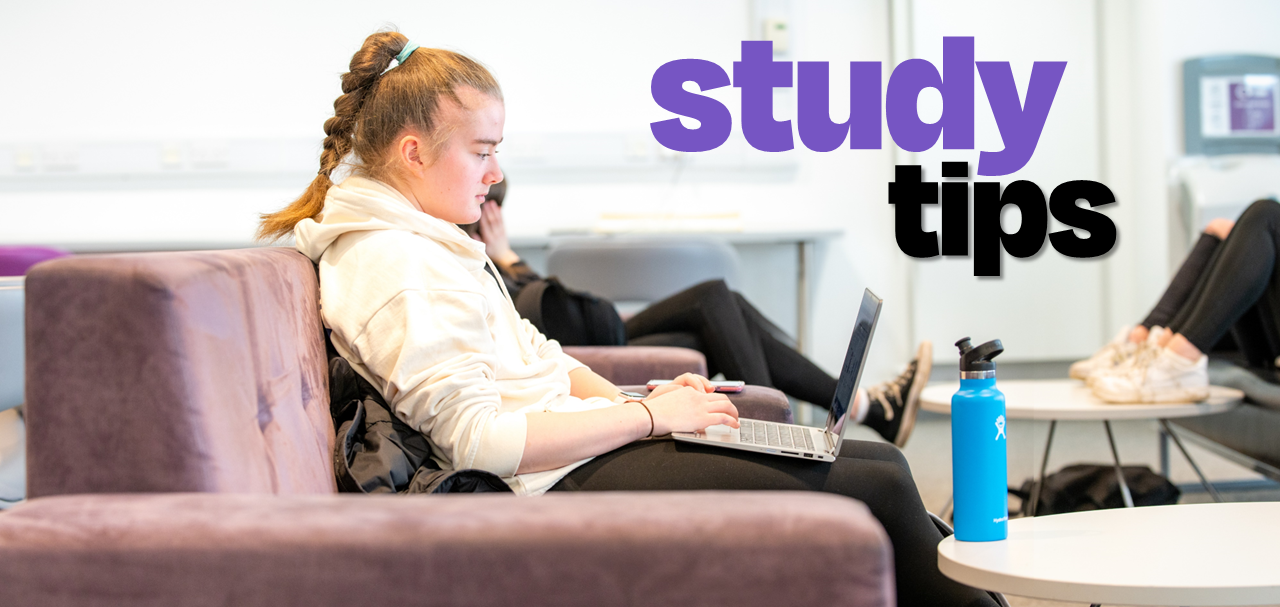Top tips for study success
Everyone learns in different ways but there are tricks and methods you can use to help make the most of studying. We've put together our top study tips to help you open the door to success.
- Get into a routine: Set time aside dedicated to studying to help you feel productive and form good study habits. You can do this daily or weekly, at home or on campus. Make sure to give yourself breaks as this helps with focus and avoiding burnout.
- Make use of campus resources: Our Library has a huge range of books, journals, e-books and other media, or you can request books from other libraries within the UHI’s 10 institutions through an inter-site loan system.
- Find your learning style: Discover your preferred learning style (visual, auditory, read/write or kinesthetic) to allow you to study more efficiently. Experiment with different techniques such as watching videos, listening to podcasts, writing notes or doing practical activities to identify what works best for you.
- Use active learning techniques: Sometimes it is difficult to absorb information when reading or listening alone. To help you engage better, try taking notes during lessons, summarising key takeaways in your own words. You can then try testing yourself to find out where you still need some practice or support.
- Stay organised: Balancing coursework, extracurricular activities, and personal commitments requires time management skills. Try writing a list of tasks, then break them down into smaller, manageable goals. You can use productivity tools such as calendars, planners, or task management apps to stay organised.
- Reduce distractions: Find a productive study environment that works for you. Pop into our Library for a quiet space free from interruptions, turn off your phone notifications, and consider using one of our soundproof study pods.
- Ask for support: We all need different types of support throughout our lives. When you're a student, that could in the form of a study group with classmates, asking your lecturer for clarity or feedback, or reaching out to our Student Services team for a chat.
- Pop into The Study Bar: As the name suggests, this is the place to “refresh” your writing style or study strategy, with support from our friendly and helpful team. This innovative resource can support you with various study skills such as referencing, dyslexia support, essay writing, spelling and grammar, and lots more.
- Take care of yourself: Looking after your health and wellbeing will help you study better, and when you’re happy and full of energy you’ll have more fun. Take time to nourish your body and mind with rest, physical activity, food, hydration and fun.
Our favourite time management techniques
- Pomodoro: The pomodoro technique is simple. Write a to do list, set a timer for 25 minutes, and focus on a single task until the timer ends. Record what you completed, then enjoy a five minute break. Keep doing this until you reach four pomodoro sessions, then allow yourself to take a longer 15-30 minute break. Repeat as often as necessary.
- Eisenhower Matrix: List all your tasks and divide them into 4 quadrants. Quadrant 1 is tasks that are important and urgent. You should do them immediately. Quadrant 2 is tasks that are important, but are not urgent. You should make a plan when you'll tackle them. Quadrant 3 is tasks that are not important, but are urgent. Delegate these tasks if possible. Quadrant 4 is tasks that are not important and not urgent that could be removed from your to do list.
- Seinfeld Method: This technique is inspired by Jerry Seinfeld's productivity quote: "Don't break the chain." The idea is that you get a calendar, and for every day that you make time to study - no matter how long you spend - you mark that day with a red cross to form a chain of "red" days. If you don't work for a day, you don't mark it with red, and you "break the chain".
- 1-3-5 Rule: The idea behind this method is to break your days down into 1 big thing, 3 medium things and 5 little things. Completing the big task will give you a sense of accomplishment, which will motivate you to continue studying. The medium tasks help towards your your larger assignments, whilst the little tasks are easy to complete, so they’ll also inspire you to keep going.
Our inclusive learning support
We’re committed to helping all our students achieve their potential, including those with disabilities of all kinds. We have assistive technology available for students including:
- Dictaphones
- LiveScribe Pens
- Read and Write Gold literacy support tool
- Mindgenius Mind Mapping Software
- Zoomtext Magnifier
- Dragon Naturally Speaking speech to text software
We can also help you with specific support in assessments and exams, such as scribes and interpreters. Get in touch with our Inclusive Learning Team to see how we can support you.
